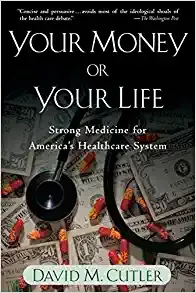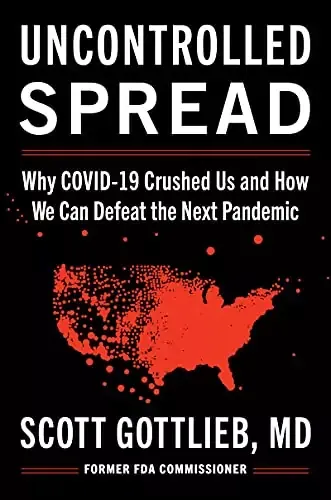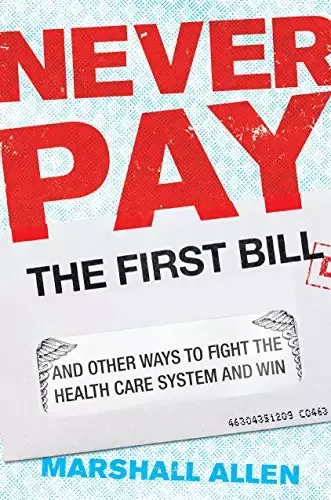Welcome to an insightful journey through the '
15 Best Books on Healthcare Policy to Read in 2024,' written by
Muhiuddin Alam on the book recommendations and reviews site,
ReadingAndThinking.com.
I have received many requests to recommend some of the best healthcare policy books. In response, I'm pleased to offer my expert recommendations in this article.
I will recommend books about the US healthcare system in this post, which are based on my in-depth study and testing in this field.
Some notable health policy books are: Inside National Health Reform, The Social Transformation of American Medicine, Remedy and Reaction, Bring Market Prices to Medicare, and Your Money or Your Life.
These aren't just the best healthcare books. Below, you'll find 15 books with detailed descriptions of each of these outstanding resources, helping you make well-informed decisions in your health policy books journey."
The Complete Guide to Understanding Healthcare System, Healthcare Reform, Healthcare Disparities, Health Policy & Best Healthcare Policy Management Books.
Top 15 Best Healthcare Policy Books to Read in 2024
Influencing policy is a key intervention in public health. Healthy public policy is a concept, perspective, and approach where health and wellbeing are considered in all aspects of policy development and decision-making not only for health policies but also for policies that can affect health and wellbeing, such as environmental, housing, transport, education, and agricultural policies.
Healthy public policy and health in all policies are often used interchangeably. Health in all policies is a more recent term and is potentially best seen as a specific approach to developing healthy public policy.
1. Inside National Health Reform
Inside National Health Reform by John E. McDonough
This indispensable guide to the Affordable Care Act, our new national healthcare law, lends an insider’s deep understanding of policy to a lively and absorbing account of the extraordinary—and extraordinarily ambitious—legislative effort to reform the nation’s healthcare system.
Dr. John E. McDonough, DPH, a health policy expert who served as an advisor to the late Senator Edward Kennedy, provides a vivid picture of the intense effort required to bring this legislation into law. McDonough clearly explains the ACA’s inner workings, revealing the rich landscape of the issues, policies, and controversies embedded in the law yet unknown to most Americans.
In his account of these historic events, McDonough takes us through the process from the 2008 presidential campaign to the moment in 2010 when President Obama signed the bill into law.
At a time when the nation is taking a second look at the ACA, Inside National
Health Reform provides the essential information for Americans to make informed judgments about this landmark law.
2. The Social Transformation of American Medicine
The Social Transformation of American Medicine by Paul Starr
This book is the most impressive history of American medical specialization and professionalization I have ever read. There is indeed no legal or administrative system in the United States.
The biggest motivation is that people in the industry resist vicious competition among peers. On the one hand, it promoted the standardization of medical practice, and on the other hand, it also created a certain "myth" about medicine and monopolized prices.
Written clearly and well. After Abbott's epoch-making work in 1988, he actually brought professional research into a new trend that was de-historical and de-embedded in the political and economic process and also contributed to the gradual convergence of professional sociology with the sociology of knowledge.
Looking back at this bead again, it can be seen that the profession not only competes with adjacent occupations in jurisdictional power, but also competes with other social agents, such as capital, public health, mutual aid, and insurance companies, thus drawing a piece of constantly changing boundaries. social field.
So historical sociology must return to the study of occupations, although the good times of experts are over.
3. Remedy and Reaction
Remedy and Reaction: The Peculiar American Struggle over Health Care Reform by Paul Starr
In no other country has health care served as such a volatile flashpoint of ideological conflict. America has endured a century of rancorous debate on health insurance, and despite the passage of legislation in 2010, the battle is not yet over.
This book is a history of how and why the United States became so stubbornly different in health care, presented by an expert with unsurpassed knowledge of the issues.
Tracing health-care reform from its beginnings to its current uncertain prospects, Paul Starr argues that the United States ensnared itself in a trap through policies that satisfied enough of the public and enriched the healthcare industry to make the system difficult to change.
He reveals the inside story of the rise and fall of the Clinton health plan in the early 1990s—and of the Gingrich counterrevolution that followed. He explains the curious tale of how Mitt Romney’s reforms in Massachusetts became a model for Democrats and then follows both the passage of those reforms under Obama and the explosive reaction they elicited from conservatives.
Writing concisely and with an even hand, the author offers exactly what is needed as the debate continues—a penetrating account of how health care became such a treacherous terrain in American politics.
4. Bring Market Prices to Medicare
Bring Market Prices to Medicare by Robert F. Coulam
Medicare is quickly approaching insolvency, in Chapter because the program pays too much for the services it provides. In Bring Market Prices to Medicare, Robert Coulam, Roger Feldman, and Bryan E. Dowd propose a groundbreaking solution: Use market-based arrangements to set prices for Medicare plans.
The authors contend that the federal government should pay only the cost of the most economical health plan in each market area. To accomplish this, both traditional fee-for-service (FFS) Medicare and private Medicare Advantage (MA) would submit bids for the government's business; the federal contribution to premiums would be set to equal the lowest bid in each market area.
This competitive pricing system would penalize plans that bid too high their beneficiaries would pay higher premiums providing an incentive for plans to offer their best prices. Meanwhile, low-bidding plans would be rewarded with increased enrollment.
Such an approach would reduce Medicare spending by 8 percent, shoring up the program's finances while empowering consumers to make sensible choices about their health care.
5. Your Money or Your Life
Your Money or Your Life: Strong Medicine for America's Health Care System by David M. Cutler
The problems of medical care confront us daily: a bureaucracy that makes a trip to the doctor worse than a trip to the dentist, doctors who can't practice medicine the way they choose, and more than 40 million people without health insurance. "Medical care is in crisis," we are repeatedly told, and so it is. Barely one in five Americans think the medical system works well.
Enter David M. Cutler, a Harvard economist who served on President Clinton's health care task force and later advised presidential candidate Bill Bradley. One of the nation's leading experts on the subject, Cutler argues in Your Money or Your Life that health care has in fact improved exponentially over the last fifty years and that the successes of our system suggest ways in which we might improve care, make the system easier to deal with, and extend coverage to all Americans.
Cutler applies economic analysis to show that our spending on medicine is well worth it--and that we could do even better by spending more. Further, millions of people with easily manageable diseases, from hypertension to depression to diabetes, receive either too much or too little care because of inefficiencies in the way we reimburse care, resulting in poor health and in some cases premature death.
The key to improving the system, Cutler argues, is to change the way we organize health care. Everyone must be insured for the medical system to perform well, and payments should be based on the quality of services provided not just on the amount of cutting and poking performed.
Lively and compelling, Your Money or Your Life offers a realistic yet rigorous economic approach to reforming health care--one that promises to break through the stalemate of failed reform.
6. A Plague Upon Our House
A Plague Upon Our House by Scott W. Atlas M.D.
When Dr. Scott W. Atlas was tapped by Donald Trump to join his COVID Task Force, he was immediately thrust into a maelstrom of scientific disputes, policy debates, raging egos, politically motivated lies, and cynical media manipulation. Numerous myths and distortions surround the Trump Administration’s handling of the crisis, and many pressing questions remain unanswered.
Did the Trump team really bungle the response to the pandemic? Were the right decisions made about travel restrictions, lockdowns, and mask mandates? Are Drs. Anthony Fauci and Deborah Birx are competent medical experts or timeserving bureaucrats? Did half a million people really die unnecessarily because of Trump’s incompetence?
So far no trusted figure has emerged who can tell the story straight—until now. In this unfiltered insider account, Dr. Scott Atlas brings us directly into the White House, describes the key players in the crisis, and assigns credit and blame where it is deserved.
The book includes shocking evaluations of the Task Force members’ limited knowledge and grasp of the science of COVID and details heated discussions with Task Force members, including all of the most controversial episodes that dominated headlines for weeks.
Dr. Atlas tells the truth about the science and documents the media’s relentless campaign to suffocate it, which included canceled interviews, journalists’ off-camera hostility in White House briefings, and intentional distortion of facts.
He also provides an inside account of the delays and timelines involving vaccines and other treatments, evaluates the impact of the lockdowns on American public health, and indicts the relentless war on truth waged by Big Businesses and Big Tech.
No other book contains these revelations. Millions of people who trust Dr. Atlas will want to read this dramatic account of what really went on behind the scenes in the White House during the greatest public health crisis of the 21st century.
7. The Premonition: A Pandemic Story
The Premonition: A Pandemic Story by Michael Lewis
Fortunately, we are still a nation of skeptics. Fortunately, there are those among us who study pandemics and are willing to look unflinchingly at worst-case scenarios. Michael Lewis’s taut and brilliant nonfiction thriller pits a band of medical visionaries against the wall of ignorance that was the official response of the Trump administration to the outbreak of COVID-19.
The characters you will meet on these pages are as fascinating as they are unexpected. A thirteen-year-old girl’s science project on the transmission of an airborne pathogen develops into a very grown-up model of disease control. A local public health officer uses her worm-eye view to see what the CDC misses and reveals great truths about American society.
A secret team of dissenting doctors nicknamed the Wolverines, has everything necessary to fight the pandemic: brilliant backgrounds, world-class labs, prior experience with the pandemic scares of bird flu and swine flu…everything, that is, except official permission to implement their work.
Michael Lewis is not shy about calling these people heroes for their refusal to follow directives that they know to be based on misinformation and bad science. Even the internet, as crucial as it is to their exchange of ideas, poses a risk to them. They never know for sure who else might be listening in.
8. Being Mortal: Medicine and What Matters
Being Mortal: Medicine and What Matters in the End by Atul Gawande
"Being Mortal" is a rare good book. The question this book asks is one that everyone must face: How should one deal with one's own aging, one's own death? As a younger generation, how should you face and properly take care of your elders? The ability of the author to write such questions in depth is evident.
I couldn't sleep in the morning, and after reading this book, I read from the light in the dark to the sun shining all over the place. Very worth reading. Aging is a continuous series of losses.
As we age, we need more than just how to deal with high blood pressure, hardened arteries, and even cancer; it's about taking care of aging feet so they don't fall, brushing my hair the way I like it, and reducing loneliness and all that comes with it Depression comes, and eventually, decent old age to say goodbye to the world. Those rational but warm words.
This is a particularly good book, dealing with disease and aging in two main ways. On the one hand, it is the attitude and way of treating the elderly and patients outside society.
Evolution from the poorhouse to nursing home to assisted living, from home care to institutional care. On the other hand, there is a subjective attitude toward death in the face of elderly patients and their families, whether to make every effort to prolong the illness or to improve the quality of life within a limited time. It is very worth thinking about.
As an Indian-American doctor, the author understands the pension traditions of different cultures. His father, who is also a doctor, has also experienced a series of difficult choices that cancer patients need to make. With such a background, the author can present this theme so completely.
9. Uncontrolled Spread
Uncontrolled Spread: Why COVID-19 Crushed Us and How We Can Defeat the Next Pandemic by Scott Gottlieb
In Uncontrolled Spread, he shows how the coronavirus and its variants were able to trounce America’s pandemic preparations, and he outlines the steps that must be taken to protect against the next outbreak.
As the pandemic unfolded, Gottlieb was in regular contact with all the key players in Congress, the Trump administration, and the drug and diagnostic industries. He provides an inside account of how level after level of the American government crumbled as the COVID-19 crisis advanced.
A system-wide failure across government institutions left the nation blind to the threat, and unable to mount an effective response. We’d prepared for the wrong virus. We failed to identify the contagion early enough and became overly reliant on costly and sometimes divisive tactics that couldn’t fully slow the spread.
We never considered asymptomatic transmission and we assumed people would follow public health guidance. Key bureaucracies like the CDC were hidebound and outmatched. Weak political leadership aggravated these woes. We didn’t view a public health disaster as a threat to our national security.
Many of the woes sprung from the CDC, which has very little real-time reporting capability to inform us of COVID-19’s twists and turns or assess our defenses. The agency lacked the operational capacity and mindset to mobilize the kind of national response that was needed.
To guard against future pandemic risks, we must remake the CDC and properly equip it to better confront crises. We must also get our intelligence services more engaged in the global public health mission, to gather information and uncover emerging risks before they hit our shores so we can head them off. For this role, our clandestine agencies have the tools and capabilities that the CDC lacks.
Uncontrolled Spread argues we must fix our systems and prepare for a deadlier coronavirus variant, a flu pandemic, or whatever else nature -- or those wishing us harm -- may threaten us with. Gottlieb outlines policies and investments that are essential to prepare the United States and the world for future threats.
10. Encyclopedia of Primary Prevention and Health Promotion
Encyclopedia of Primary Prevention and Health Promotion
Public Health is one of the fastest-growing university programs in the United States today. At the same time, the challenges that face the practitioner continue to grow and become more complex. This Encyclopedia of Primary Prevention and Health Promotion, 2nd ed covers more than 250 topics, taking a lifespan approach to the fields of public health and prevention.
The encyclopedia is divided into four volumes:
- Foundational Topics
- Early Childhood and Childhood
- Adolescence
- Adulthood and Older Adulthood Within each volume, issues of illness prevention and health promotion (sometimes referred to as "positive psychology") are addressed in chapter-length entries arranged alphabetically.
An international group of contributors synthesizes research focusing on improving the physical and mental health of the community as a whole. Each entry will have a structured format: Introduction, Definition of Terms, Prevalence, Theories, Empirical Studies, and Strategies (What Works, What Is Promising, What Doesn't Work).
Each entry concludes with a look ahead to the coming decades of Public Health - what are the next steps to primary prevention and health promotion - and a "See Also" box recommending books, films, or articles by the editors for further reading. The encyclopedia is designed for practitioners, students, and researchers working in prevention, public health, and psychology.
It will also serve as a reference for practitioners in sociology, social work, nursing, and medicine. The second edition more than doubles the number of entries in the first edition by adding entries focusing on gender, African American and Latino issues, social support, social and emotional learning, and physical health and disease. All entries from the first edition will be rewritten and expanded, reflecting the most up-to-date thinking in the field.
11. The Power of Women: A Doctor's Journey of Hope and Healing
The Power of Women: A Doctor's Journey of Hope and Healing by Denis Mukwege
Nobel laureate, world-renowned doctor, and noted human rights activist Dr. Denis Mukwege comes to an inspiring clarion call to action to confront the scourge of sexual violence and better learn from women's resilience, strength, and power.
At the heart of Dr. Mukwege’s message will be the voices of the many women he has worked with over the years. Dr. Mukwege will use individual cases to reassure all survivors that, even if their psychological wounds may never fully heal, they can recover and thrive with the right care and support.
Dr. Mukwege’s dramatic personal story is interwoven throughout as he explores the bigger issues that have become a focus of his advocacy. He will seek to explain why sexual violence is so often overlooked during the war, and how governments need to recognize and compensate victims.
He will also stress the importance of breaking down the taboos surrounding the assault and the necessity of building a system that supports women who come forward.
His words advocate for saying ‘no’ to indifference and he asks readers to reckon with the West’s involvement in perpetuating sexual violence in places like the Democratic Republic of Congo and to confront the abuse taking place in their own communities.
Sexual violence does not occur in a vacuum. The conflict in the Democratic Republic of Congo, which has raged for over 20 years and has claimed an estimated 5 million lives, is inseparable from Western patriarchy and economic colonization. And this cycle of violence and spoils is not limited to Congo. Dr. Mukwege’s work has led him to South Korea, Latin America, the Middle East, and elsewhere in Africa, where he has found striking similarities in women’s testimonies.
The truth is, through the intricate ties of the global economy, we are all implicated in violence against women – whether it occurs amidst the fighting in the Democratic Republic of Congo or on college campuses in the West. Dr. Mukwege’s writing will address men as well, encouraging and guiding them to become allies in the fight against sexual abuse, in war, and in peace.
Building more inclusive, gender-balanced societies will require developing what he calls “positive masculinity” – a systemic change in male behavior and attitudes towards women. Dr. Mukwege hopes to inspire other men to speak out and join the struggle, rather than leaving women to fight the battle alone.
He will also make the case, drawing from his experience and a wealth of research on the topic, that when women are involved as economic and political decision-makers, all of the social benefits.
The Power of Women will illuminate the enduring strength of women in the face of violence and trauma, and give hope for the potential of individuals to turn the tide.
12. Summary Of The Real Anthony Fauci
Summary Of The Real Anthony Fauci By Robert F. Kennedy by Daniel Tracy
The Real Anthony Fauci recounts how he began his career as "America's Doctor" during the early stages of the AIDS crisis by collaborating with pharmaceutical companies to undermine safe and successful off-patent AIDS therapies.
Fauci staged fake research and then lobbied the US Food and Drug Administration (FDA) to approve a lethal chemotherapy treatment that he had excellent cause to believe was ineffective against AIDS.
Fauci broke federal regulations multiple times to allow his pharmaceutical partners to exploit underprivileged and dark-skinned children as lab rats in fatal AIDS and cancer chemotherapy trials.
Note: This is an unofficial summary and analysis of Robert F. Kennedy Jr.
book "The Real Anthony Fauci: Bill Gates, Big Pharma, and the Global War on Democracy and Public Health (Children’s Health Defense), bringing you the essential ideas in a succinct and easy-to-read format.
It's a quick way to get the most important ideas from excellent books and bestsellers in minutes rather than hours.
13. Measles Book
Measles Book: Thirty-Five Secrets the Government and the Media Aren't Telling You about Measles and the Measles Vaccine by Children's Health Defense
Measles! We all have seen or heard scary stories about “outbreaks” in the media. It has even been declared a “public health emergency” at various times. Is it true? Are we and our children at risk?
The Measles Book: Thirty-Five Secrets the Government and the Media Aren’t Telling You about Measles and the Measles Vaccine will help you answer these questions. You will find out if this is just another example of the media, government, and industry misleading us or whether we really have a lot to worry about.
The Measles Book presents reliable medical information from the most credible sources available. It is intended to help you make an informed choice about vaccinating your child. The main focus is measles, but many of the issues are relevant to other childhood vaccines. Within the book's pages, the reader will discover thirty-five secrets being kept from the general public about childhood vaccines, especially the measles vaccine.
Just a sampling of these secrets include:
- Vaccines are not safe for every child and the government and pharmaceutical companies have known this for years.
- Some children will get injured or die from vaccines and the government and pharmaceutical companies know this, too.
- Pharmaceutical companies have developed an incredible way to make money from vaccines, and not be held accountable.
- When a child is injured or killed by a vaccine, the pharmaceutical company does not pay for the damage it caused—we do!
Learn the other thirty-one secrets when you read The Measles Book by Children's Health Defense, a nonprofit organization committed to the health of our children and challenging misinformation spread by Big Pharma, the government, and the media. The information in The Measles Book is vital for parents to know so they can make informed decisions for their children.
14. Never Pay the First Bill
Never Pay the First Bill by Marshall Allen
Every year, millions of Americans are overcharged and underserved while the healthcare industry makes record profits. We know something is wrong, but the layers of bureaucracy designed to discourage complaints make pushing back seem impossible. At least, this is what the healthcare power players want you to think.
Never Pay the First Bill is the guerilla guide to health care the American people and employers need. Drawing on 15 years of investigating the healthcare industry, reporter Marshall Allen shows how companies and individuals have managed to force medical providers to play fair and show how you can, too.
He reveals the industry's pressure points and how companies and individuals have fought overbilling, price gouging, insurance denials, and more to get the care they deserve. Laying out a practical plan for protecting yourself against the system's predatory practices, Allen offers the inspiration you need and tried-and-true strategies such as:
Analyze and contest your medical bills, so you don't pay more than you should
Obtain the billing codes for a procedure in advance. Write an appropriate treatment clause before signing financial documents. Get your way by suing in small claims court.
Few politicians and CEOs have been willing to stand up to the medical industry. It is up to the American people to equip themselves to fight back for the sake of our families--and everyone else.
15. Health Policy and Politics: A Nurse's Guide
Health Policy and Politics: A Nurse's Guide by Jeri A. Milstead
Each new print copy includes Navigate 2 Advantage Access that unlocks a comprehensive and interactive eBook, student practice activities and assessments, a full suite of instructor resources, and learning analytics reporting tools.
Health Policy and Politics: A Nurse's Guide, Sixth Edition encompasses the entire health policy process from agenda-setting through policy and program evaluation. This is an essential text for both graduate and undergraduate students.
The Sixth Edition features expanded information on the breadth of policymaking and includes the impact of social media, economics, finance, and other timely topics. The authors draw from their extensive experience and provide concrete examples of real-life situations that help students understand the link between nursing, policy theory, and political action.
What is Health Policy? What does Health Policy mean?
Health Policy Meaning & Explanation.
Health policy can be defined as the "decisions, plans, and actions that are undertaken to achieve specific healthcare goals within a society."
According to the World Health Organization, an explicit health policy can achieve several things: it defines a vision for the future; it outlines priorities and the expected roles of different groups, and it builds consensus and informs people.
There are many categories of
health policies, including personal healthcare policies, pharmaceutical policies, and policies related to public health such as vaccination policies, tobacco control policies, or breastfeeding promotion policies.
They may cover topics of financing and delivery of healthcare, access to care, quality of care, and health equity.
You May Also Like: Best Books on Healthcare Policy
Know someone who might be interested in this article? Share it with them.





















